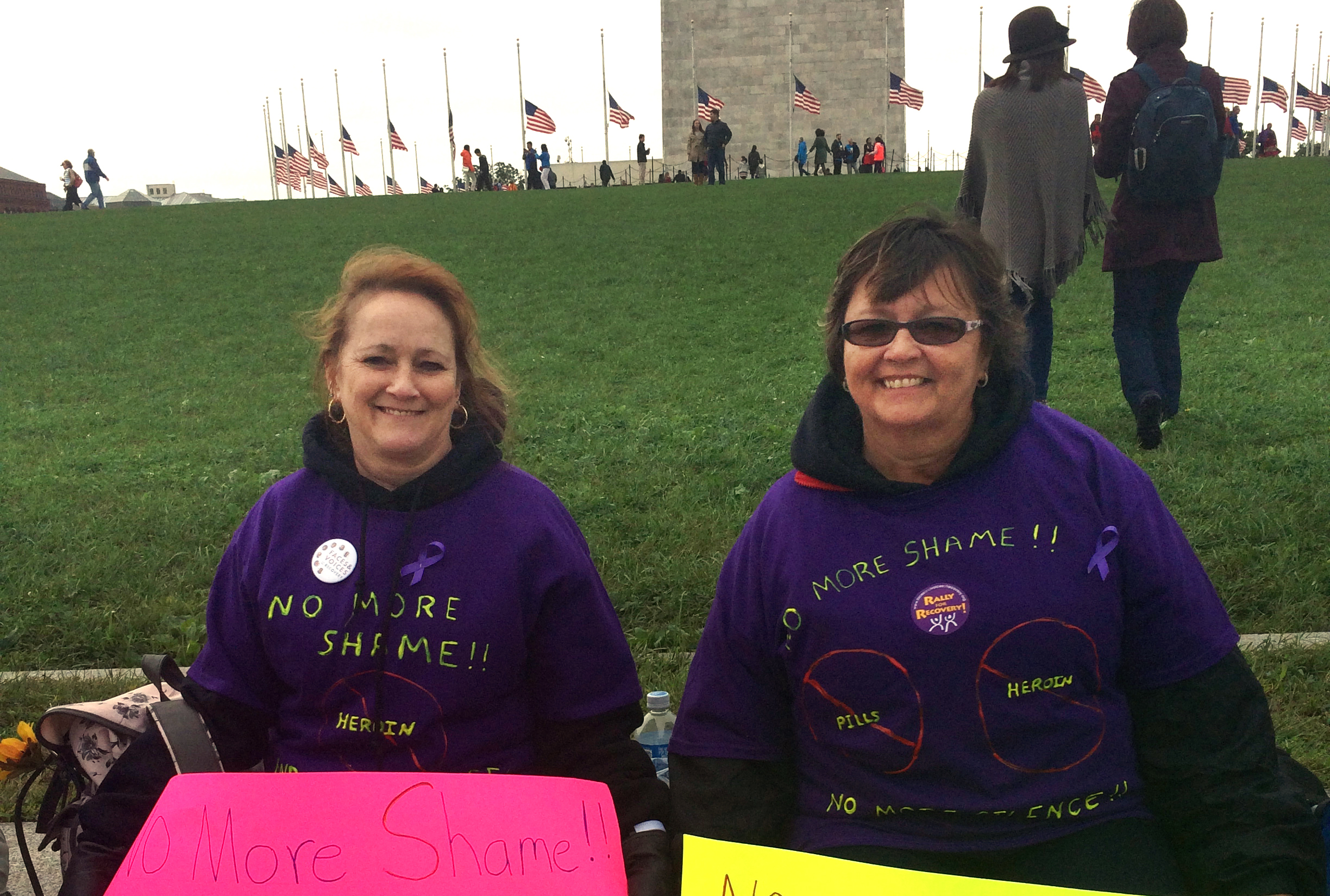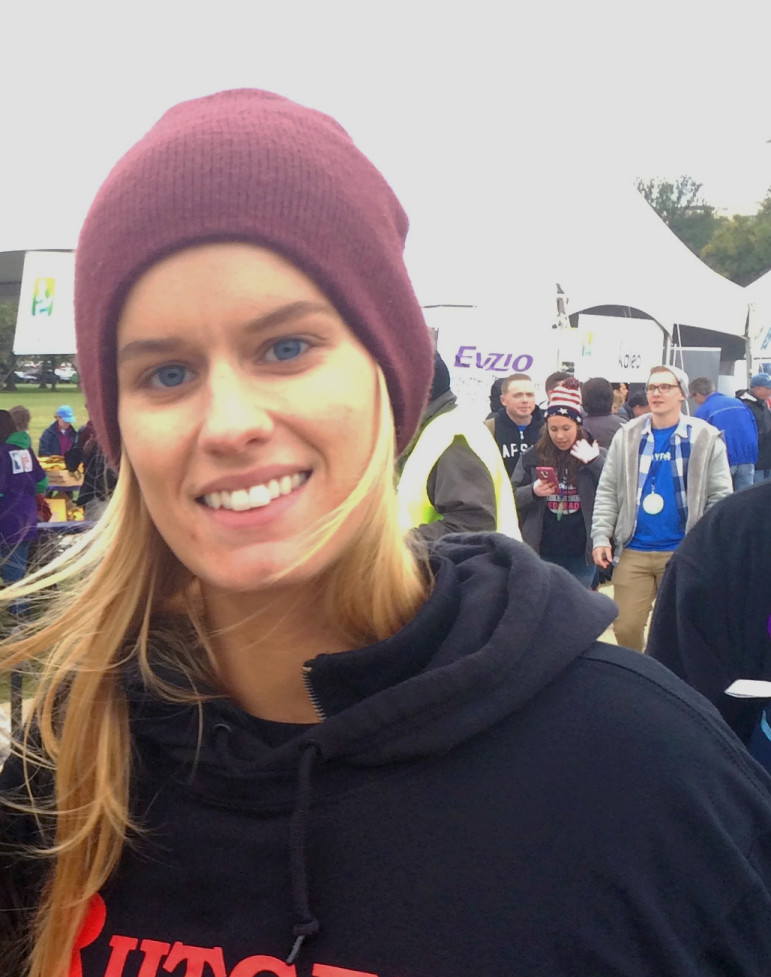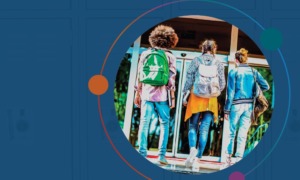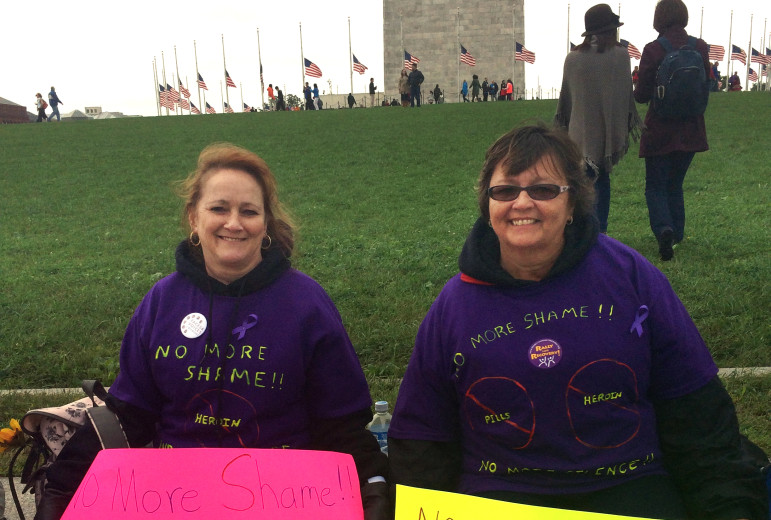
Joe Guszkowski
Sherry Collier (left) and Cathy Bowrey came to the rally from Maryland to show their support for their children and other families, and put an end to the shame surrounding addiction.
WASHINGTON — Gretchen Schilke was 20 years old and 79 days clean Sunday. It’s the longest period of sobriety she’s had since she was 12.
But there was a time during her addiction, she said, when she didn’t think she would ever get help.
“I didn’t know it was possible to recover from heroin addiction,” Schilke said. “I thought you were addicted to heroin and that’s your life. I thought I was gonna die at 30 and that was just my story.”
Schilke was among thousands of people gathered Sunday afternoon on the National Mall for the Unite to Face Addiction rally, intended to raise awareness about addiction and recovery and launch a new, nationwide campaign called Facing Addiction.
The rally was a chance for young people like Schilke to feel part of a larger community and witness the possibility of overcoming addiction, advocates said.
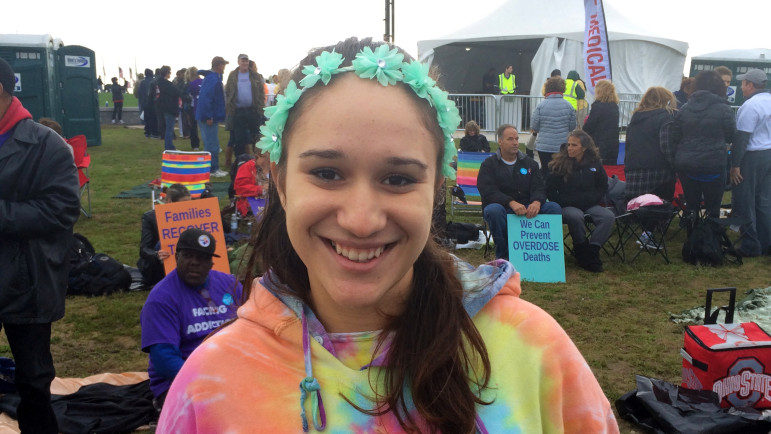
Joe Guszkowski
Gretchen Schilke, 20, was among the thousands on the National Mall for the rally and campaign launch for Facing Addiction.
“It’s important for young people to know that recovery is possible, that going back to school is possible. That having fun and partying sober is possible,” said Arielle Spanvill, community mapping and sustainability coordinator for Transforming Youth Recovery, a nonprofit charity that aims to help students in recovery.
The event, which unfolded at the foot of the Washington Monument, featured musical performances, speeches from celebrities and politicians, book readings and signings, and access to a variety of addiction and recovery resources and services. Thousands packed the grassy area in front of the stage, waving signs and cheering as the speakers and musicians shared their own stories of addiction.
Justin Luke Riley, president and CEO of the grassroots advocacy organization Young People in Recovery, said the rally gave people a concrete cause to get behind.
He said it was important for young people to “show up and represent” to reduce shame and stigma associated with recovery.
[Related: They Climb, Bike, Run, Lift, Box Their Way Out of Addiction]
“Look, there are millions and millions of Americans who are in recovery, and several thousand of them showed up in D.C. to show that they weren’t ashamed,” Riley said.
One of the challenges for young people facing addiction or in recovery is that social outings are often based around using drugs and alcohol, said Ricki Arvesen, who works for the Center of Alcohol Studies at Rutgers University.
“It’s hard for us to find a community where we feel safe and we can be open,” she said. “And I think a day like this brings awareness and brings conversation about it.”
Another challenge for young people is that they might not feel like they fit into the common conception of what an addict looks or acts like, which can exclude them from getting help, said Mariel Harrison, chapter coordinator for Young People in Recovery.
Substance use disorder derailed her adolescent and teenage years, Harrison said.
“Had services been offered to me at a younger age and had people given me a message of hope and a message of, ‘You don’t need to be 45 to get sober, you can be 16,’ things might have been totally different,” she said.
The images often associated with drug addicts and alcoholics — urban, poor, clutching a bottle in a brown paper bag — are not the whole picture, Harrison said.
“An addict doesn’t look like anything,” she said. “I think it’s so important that the face of alcoholism and the face of addiction — and even more importantly the face of recovery — is able to be seen not as one cookie-cutter thing.”
Harrison said the rally was an opportunity for young people to see others who looked like them and had been through recovery.
“And I think the only way for people to see that picture is when people in recovery show that picture,” she said.
Families whose loved ones had battled addiction also were a large presence at the rally. Cathy Bowrey and Sherry Collier, from Maryland’s eastern shore, sat on a wall at the foot of the Washington Monument holding signs that read: “No More Shame! I am a Mom of an Addict.”
The women, who had children in recovery or still using drugs, said families are necessary to provide support for young people in addiction, but that it has been hard on both of them.
“It’s just as much hell on us as it is them,” Bowrey said.
Nonetheless, they said, they showed up at the rally to show their support and put an end to the shame surrounding addiction.
“We know a lot of people … their parents turn their back because they think they’re trash or whatever. And we’re just here to say no, they’re not,” Collier said.
Gretchen Schilke, who traveled from New Jersey with the Hope All Day recovery program, where she has been staying, said she thought the rally’s scope and national visibility could save the lives of other people who face addiction.
“If they see this, if they see how many people are here … they can see there’s a chance for them,” she said. “They don’t have to keep living like that.”
More related articles:
Insurance Coverage for Substance Abuse Improving But Still Limited
Unspoken Truths: Young People in Recovery
Obey the Signs or End Up Like Me


